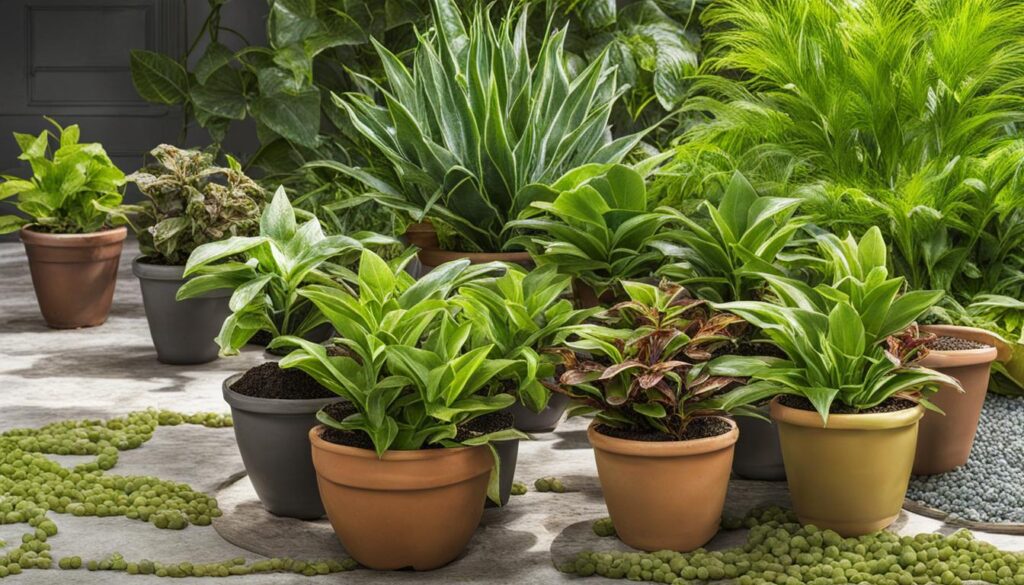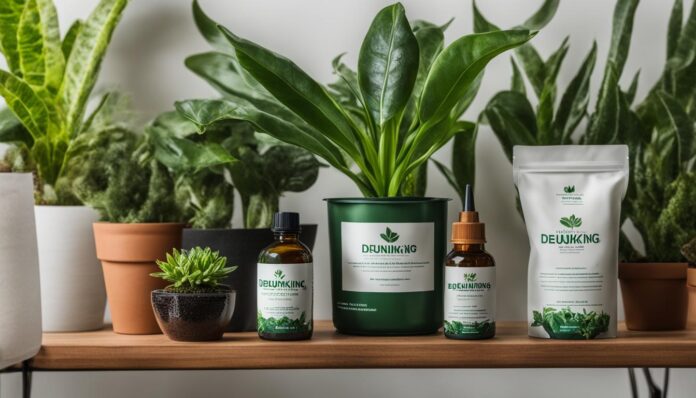Contrary to popular belief, houseplants do require fertilization for optimal growth and health. While outdoor plants can obtain nutrients from various sources in their natural environment, indoor plants lack access to these nutrients. Therefore, fertilizing houseplants during the growing season is essential to provide them with the necessary nutrients they need to thrive. This promotes healthy and vibrant plant growth.
Key Takeaways:
- Houseplants require fertilization to compensate for the lack of natural nutrient sources in their indoor environment.
- Fertilizing indoor plants during the growing season promotes healthy and vibrant plant growth.
- Fertilizing sick plants may further stress them, and addressing underlying issues is crucial for their recovery.
- Over-fertilization can harm plants and should be avoided to prevent nutrient imbalances.
- Choosing the right fertilizer, such as instant plant food tablets, ensures optimal growth and overall health of indoor plants.
Houseplant Fertilization Myths
When it comes to caring for indoor plants, there are several myths about fertilization that need to be debunked. Let’s explore some of the common misconceptions and set the record straight.
Myth #1: Houseplants don’t need fertilizer
Contrary to popular belief, houseplants do require fertilization to thrive. While outdoor plants can obtain nutrients from their surroundings, indoor plants lack access to these natural sources. Without fertilization, they may suffer from nutrient deficiencies, leading to stunted growth and lackluster appearance.
“Fertilizing your houseplants is crucial to compensate for the nutrient deficit in their indoor environment. It provides them with the essential elements they need for healthy growth,” says Emma Green, a renowned horticulturist.
Myth #2: Plants should not be fed in the winter
It is a common misconception that fertilizing houseplants during winter is unnecessary. While some plants do go dormant and have reduced nutrient requirements during this time, others may still benefit from feeding. Each plant has unique needs, and it’s essential to assess their fertilization requirements individually.
For example, tropical plants that continue to grow actively during winter, such as the Chinese evergreen (Aglaonema), still need regular fertilization to thrive. On the other hand, plants like the snake plant (Sansevieria), which enter a period of dormancy in the winter, may require reduced or no fertilization.
To ensure optimal growth and health, it is advisable to consult specific care guidelines for each plant species.
Expert Tip
If you are unsure about the fertilization needs of your houseplants, consult a local nursery or horticulturist for guidance. They can provide valuable insights based on your specific plant varieties and environmental conditions.
By dispelling these common myths and understanding the importance of fertilization for indoor plants, you can ensure the long-term health and vitality of your beloved green companions.
Incorrect Assumptions About Sick Plants and Fertilization

When it comes to caring for sick plants, there is often a mistaken belief that fertilization is the key to their recovery. However, this couldn’t be further from the truth. Adding fertilizer to a sick plant can actually do more harm than good, further stressing the plant and hindering its ability to heal. Instead, a different approach is needed.
The first step in nursing a sick plant back to health is to identify and address the underlying issues that may be causing its decline. These issues could include improper light conditions, inadequate watering, or pest infestations. By pinpointing the root cause of the plant’s sickness and taking appropriate actions, you can give it the best chance of recovery.
Proper lighting is crucial for any houseplant’s well-being. If a plant is not getting enough light, it may exhibit signs of yellowing leaves, stunted growth, or wilting. On the other hand, too much light can cause leaf burn or sunscald. By providing the right amount of light for the specific plant species, you can help it regain its strength and vitality.
Similarly, watering is another critical aspect of houseplant care. Overwatering can lead to root rot and other fungal diseases, while underwatering can cause dehydration and wilting. Understanding the water requirements of your plants and establishing a proper watering routine can greatly contribute to their recovery.
It is important to note that fertilization should only be considered once the sick plant shows signs of active growth and is on the path to recovery. At this stage, fertilizing can help promote healthy new growth and strengthen the plant’s overall vitality. However, it is still important to follow the recommended dosage and frequency for fertilization to avoid overburdening the recovering plant.
The Importance of Optimal Fertilization Amounts
When it comes to houseplant care, finding the right balance in fertilization is key to promoting healthy plant growth and preventing any potential harm. While some may believe that using more fertilizer will lead to better results, this is merely a myth that can actually have detrimental effects on your plants.
Over-fertilization can burn the roots of your plants and cause nutrient imbalances, leading to stunted growth and overall poor health. Plants have specific nutrient requirements that must be met in order for them to thrive. Excess fertilizer not only harms the plants, but it can also have negative environmental impacts.
To ensure optimal growth, it is important to follow recommended feeding guidelines and use a gentle, balanced plant food in appropriate amounts. This will provide your houseplants with the precise nutrients they need without overwhelming them. By maintaining this delicate balance, you can support your plants’ development and create a healthy, vibrant indoor garden.
The Dangers of Over-Fertilization
Over-fertilization can have several negative consequences for your houseplants:
- Root Burn: Excessive amounts of fertilizer can burn the delicate roots of your plants, impairing their ability to take in water and nutrients.
- Nutrient Imbalances: Too much fertilizer can disrupt the natural balance of nutrients in the soil, leading to deficiencies or toxicities.
- Environmental Impact: Excess fertilizer can leach into groundwater or runoff into nearby water bodies, causing pollution and harm to aquatic ecosystems.
To avoid these issues, it is crucial to adhere to fertilization guidelines specific to your houseplant species and choose a fertilizer that suits their nutrient requirements.
“Finding the right balance in fertilization is key to promoting healthy plant growth and preventing any potential harm.”
Meeting Your Plants’ Nutrient Requirements
Each houseplant has its own unique nutrient requirements, and it is essential to understand and address these needs to maintain their health. Proper fertilization helps fulfill these nutrient requirements by providing the necessary elements for growth and development.
When selecting a fertilizer, consider factors such as the plant species, growth stage, and soil composition. A balanced fertilizer with equal amounts of nitrogen (N), phosphorus (P), and potassium (K) is often suitable for general houseplant care. However, certain plants may require specialized fertilizers that cater to their specific needs.
It’s also important to note that fertilization amounts can vary depending on the plant’s growth stage and the time of year. For instance, plants may require less fertilizer during their dormant period or when they are not actively growing.
The image above perfectly captures the essence of houseplant care and highlights the importance of proper fertilization for healthy plant growth.
Choosing the Right Fertilizer for Houseplants
When it comes to houseplant care, fertilization plays a crucial role in providing the necessary nutrients for optimal growth and plant nutrition. While liquid fertilizers are commonly recommended, they may not always be the most cost-effective option due to their high water content.
An alternative to liquid fertilizers is Instant Plant Food, a convenient and environmentally friendly choice for green living. These dissolving fertilizer tablets are specifically designed for houseplants and offer a hassle-free way to provide essential nutrients. By simply dissolving these tablets in water, you can ensure your plants receive the nutrition they need to thrive.
By choosing the right fertilizer and following a regular fertilization schedule, you can promote the overall health and vitality of your indoor plants. Whether you opt for liquid fertilizers or the convenience of dissolving tablets like Instant Plant Food, proper plant nutrition is key to green living and successful houseplant care.
FAQ
Do houseplants need fertilizer?
Yes, houseplants do require fertilization for optimal growth and health. Indoor plants lack access to natural nutrient sources, so fertilizing them during the growing season is essential to provide them with the necessary nutrients they need to thrive.
Are there any common myths about houseplant fertilization?
Yes, there are some common myths surrounding houseplant fertilization. One prevalent myth is that houseplants don’t need fertilizer at all, but this is false. Another myth is that plants should not be fed in the winter, which is also not always true. It’s important to assess the fertilization needs of each individual plant.
Can fertilizer help sick plants recover?
No, adding fertilizer to a sick plant can further stress it and hinder its ability to heal. It is important to address underlying issues such as improper light or watering conditions instead of relying solely on fertilization to nurse a sick plant back to health.
Is it better to use more fertilizer for better plant growth?
No, using more fertilizer does not necessarily lead to better plant growth. Over-fertilization can actually harm plants by burning their roots and causing nutrient imbalances. It is important to follow recommended feeding guidelines and use the appropriate amount of fertilizer.
What is the best fertilizer option for houseplants?
Liquid fertilizers are often considered the best option, but they may not always be the most cost-effective choice. Using a dissolving fertilizer tablet, like Instant Plant Food, can be a more convenient and environmentally friendly option specifically crafted for houseplants.

